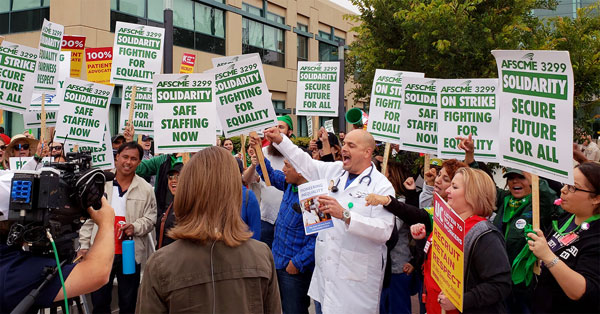
April 10, 2019; Sacramento Bee
Yesterday, workers at various campuses of the University of California (UC) walked out for a one-day strike, their fourth job action in twelve months. Contracts between the university and two workers’ unions expired in 2017, and the parties have been unable to successfully negotiate a renewal since then. To add insult to injury, say the unions, the university system has engaged in unfair practices to discourage workers from participating in strikes and other union activities.
Workers chanted, “UC, UC, you’re no good; Treat your workers like you should!”
The university seems dismissive of the strikes. Spokeswoman Claire Doan said, “UC has focused on reaching an agreement, while AFSCME [American Federation of State, County and Municipal Employees] is intent on staging strikes.” Doan told Cathie Anderson of the Sacramento Bee that the union will “try and fail” to “extract bargaining concessions from the university through economic pressure.”
Part of the negotiation issue is pay; the workers want a yearly 5.5 percent increase over the next four years, and the university offered three percent plus a one-time, $750 lump payment. The union, the (AFSCME) Local 3299, represents about 24,000 workers from UC’s five academic hospitals. University Professional and Technical Employees-Communications Workers of America (UPTE-CWA), Local 9119’s 15,000 members approved a strike in solidarity with AFSCME.
Another significant point of contention, which has so far gone unaddressed by UC, is the hiring of contract workers. Many workers fear that increasing use of contractors, who are paid less than full-time employees, will put them out of a job.
“I felt like the floor got pulled out from underneath me…what good is [the raise] if I don’t have a job?” asked Jasmine Tobin, a certified occupational therapist. Rosalyn Williams, an MRI technologist at Ronald Reagan UCLA Medical Center, said, “We are asking for a raise, but if they give that to us how do we know they won’t outsource our jobs next year…[contractors] are waiting for us to go on strike so they can take our jobs.”
Now, says the union, the university has violated labor laws in an attempt to stymie protests.
Sign up for our free newsletters
Subscribe to NPQ's newsletters to have our top stories delivered directly to your inbox.
By signing up, you agree to our privacy policy and terms of use, and to receive messages from NPQ and our partners.
“Through illegal actions, UC has trampled state law and created an unwelcoming workplace that undermines workers’ ability to exercise their rights,” said Kathryn Lybarger, the president of AFSCME Local 3299.
According to the Bee,
- Supervisors have rewarded unionized workers who cross the picket line with free meals and even a pool party.
- Management attempted to force out a UC Merced custodian who serves on the union’s bargaining committee by reprimanding her union activity and dealing out unfavorable work assignments. The worker took an unpaid leave, citing work-related stress.
- In a private meeting, a UC San Diego supervisor encouraged workers to “give themselves a raise” by opting out of AFSCME membership.
- Various UC representatives have attempted to instill fear in union members with physical confrontation.
Lybarger said, “The University of California has already financed lavish executive salaries and multi-million-dollar secret slush funds off the backs of its lowest-paid workers by imposing terms that outsource jobs and make income inequality worse…We cannot and will not allow UC to violate the rights of these workers by trampling state law.”
Lybarger is referring to a report by state auditor Elaine M. Howle that was released in 2017. Howle found that the UC Office of the President had not only underspent funds in relation to its annual budget requests, it “accumulated more than $175 million in undisclosed restricted and discretionary reserves” and “was unable to provide a complete listing of the systemwide initiatives, their costs, or an assessment of their continued benefit to the university.” She also found that executive salaries, budgets, and administrative staffs were much higher in the UC system than at comparable institutions. So, it would seem the university might have some spare cash. (The president’s office told the auditor they had already begun to address the salary discrepancies.)
At the time of the original strikes in 2018, Chris Brooks at Labor Notes pointed out how much harder workers of color were hit by the university’s employment practices. An AFSCME study noted that not only did administrative salaries rise between 2005 and 2015 as lower-level employees’ salaries fell, but also the proportion of Black workers fell 37 percent between 1996 and 2015.
“As we get better wages and protections, they don’t hire African American workers, but young white people,” said Maricruz Manzanares, a senior custodian at UC Berkeley.
Brooks explained that the unions’ concerns go deeper than salaries; they are concerned about contracts UC has with vendors who also work with Immigrations & Customs Enforcement (ICE). (The university’s president, former US Secretary of State Janet Napolitano, declared UC a “sanctuary campus.”)
The workers’ distress has drawn some attention from prominent figures; NPQ noted that during the initial strike last year, Senator Kamala Harris canceled her UC Berkeley commencement speech in support of the workers. Last week, AFSCME 3299 noted that Senator Bernie Sanders expressed his support of their movement.—Erin Rubin













